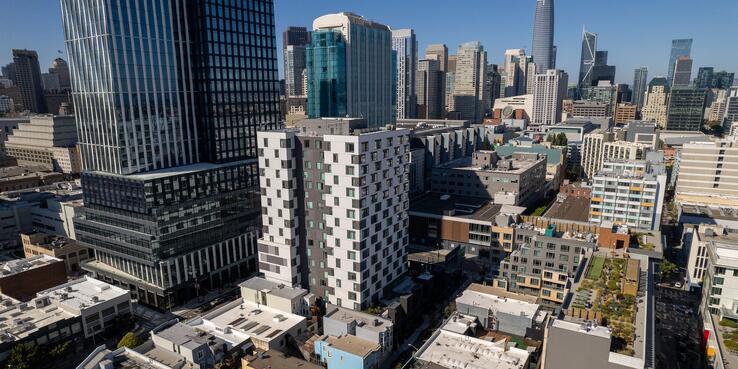In 2022, SPUR began conducting policy research and advocacy to transform downtown San Francisco into a 24-hour, mixed-use hub that is welcoming to all Bay Area residents and visitors. Since the pandemic, the office vacancy rate in the area has climbed to 35%, according to real estate firm Jones Lang Lasalle. Although premium office spaces continue to be attractive for companies, older Class B and Class C office buildings with relatively few amenities are harder to lease. SPUR and others have long argued that these obsolete buildings should be converted into apartments both to reanimate the core of the city and to provide housing for more people in an area rich in transit, jobs, culture, recreation, and entertainment.
In 2023, SPUR, in partnership with ULI San Francisco, released a policy report that analyzed the physical suitability of office buildings for redevelopment as housing and tested the financial feasibility of conversion projects. We found that, under the policy and economic conditions of that time, projects would not be financially feasible because the city’s requirements resulted in extremely high development costs. Our report laid out six policy imperatives for realizing office-to-housing conversions on a large scale, tackling regulatory and financial constraints. Our report and subsequent advocacy have led the development community, other partners, and the City of San Francisco to implement our core recommendations.
San Francisco Has Adopted SPUR’s Recommendations to Accelerate Office Conversions
Our 2023 report From Workspace to Homebase and subsequent advocacy led the city to implement all six of our recommendations for removing regulatory and financial constraints to conversions of obsolete office buildings.
| SPUR Recommendation | Implemented Program or Policy Change |
| 1. Remove obstacles in building codes and simplify approvals.
| In July 2023, the city passed legislation to waive planning code requirements (Sec. 210.5), thereby streamlining the permitting process and clarifying that state laws like Senate Bill 423 and Assembly Bill 2011 would provide a ministerial approvals pathway for adaptive reuse projects. In September 2024, the Department of Building Inspections published guidelines that clarified building and fire code requirements and alternative methods of compliance. |
| 2. Reduce the inclusionary requirement for office conversions for a period of time or for a limited square footage of conversion. | In March 2025, the Board of Supervisors approved legislation waiving inclusionary housing and impact fees on up to 7 million square feet of converted space. |
| 3. Reduce city impact fees and in-lieu fees. | |
| 4. Provide incentives for office conversion through a reduction of the real estate transfer tax and a reimbursement of property tax, restricted to a period of time or a limited square footage of conversion. | In March 2024, voters approved Proposition C, a ballot measure that waives the real estate transfer tax on up to 5 million square feet of converted space. |
| 5. Explore state legislation to create property tax incentives for conversions. | In the 2024 legislative session, the state legislature passed AB 2488 (Ting), which allows San Francisco to establish a special financing district that would reimburse eligible projects, with future property tax incremental revenues to help close the gap. In June 2025, the mayor and Board of Supervisors approved legislation to establish the financing district. |
| 6. Create a Prop M “reserve” for the office space removed through conversions to allow for more office development once the market recovers. | In March 2024, voters approved Proposition C, which allows any of the commercial space that is removed through conversions to be restored to the city’s Proposition M “reserve” for future office development. |
The policy changes enacted by the city in the last two years show a deep commitment to reimagining downtown as a mixed-use district. Converting obsolete office buildings into housing delivers economic, social, environmental, and fiscal benefits to the city and the state. In addition to creating more housing for workers in an area with high-quality transit, conversions will increase support for small businesses, artists, and cultural organizations. Redeveloping low-value space will also increase the value of remaining office building stock and increase property and sales tax revenues for the city.
In New York City, similar incentive programs have catalyzed reinvestment in Lower Manhattan and Midtown. In fact, 25% of office building transactions in the first half of 2024 were for planned conversions. Office-to-residential conversions in other North American cities, such as Philadelphia and Calgary, have helped transform central business districts into 24/7 social hubs featuring housing, restaurants, retail, entertainment, and culture.
We're eager to see what happens next in San Francisco.
